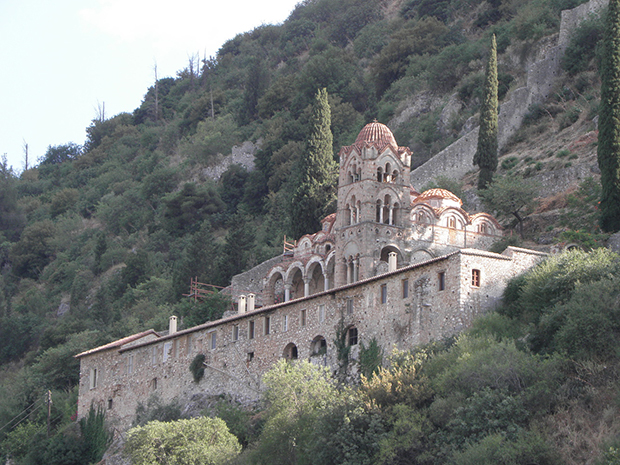Heartland Of European Culture

By Gregory Demopolous
The long and often spectacular history of the Peloponnese, the large peninsula that forms the southern part of the Greek Mainland, makes it a veritable heartland of European and Western culture,” noted Peter Sommer, founder of Peter Sommer Travels.

The Peloponnese is the heady stuff of legends. Mythological strongman Hercules fought the Nemean lion, Paris eloped with Helen of Troy and Jason and the Argonuats set sail looking for the fabled Golden Fleece. The region is central in Greek myth - home to the heroes of Homer’s Iliad like King Agamemnon and Nestor and a place often frequented by the gods themselves, be it in love or wrath.
For millennia the mountains, gorges and beaches kept invaders at bay. Today those same impediments to the ancients now draw visitors who come in peace and leave money instead of destruction.
Peloponnese hospitality is renowned and the area’s food is ranked amongst the best in Greece. Vineyards have been a major factor in the regrowth of the region’s viticulture.
“From the first farmers of the Neolithic Age to the Bronze Age Mycenaeans, via the glories of Classical Greece and Rome and the splendors of the Byzantine Empire, all the way up to the Ottoman Empire and the Greek War of Independence, the Peloponnese has often been center-stage to key historical events.”
The Peloponnese conjures up images of ancient glories, epic struggles, valiant heroes and majestic vistas. The mere mention of names like Arcadia or Corinth, Sparta or Olympia, Nemea or Mycenae awakens our imagination, reminding us of fascinating legends and dramatic historical scenes reaching far across the ages.
The peninsula has been inhabited since prehistoric times and the current name comes from ancient Greek mythology, the legend of Pelopes, who was said to have been the conqueror of the region.
An international event today, the first Olympic games were held at Olympia in 776 BC. That date is often used to depict the beginning of Greece’s classical period. At that time the area was at the center of ancient Greece and some of the most powerful city-states were located there. It was also where some of the bloodiest ancient battles were fought.
The famed cities of Sparta, Corinth, Argos and Megalopolis were in this area. Soldiers from Peloponnese fought the Persian Wars. An expanding Rome defeated the Greeks in 146 BC and It became the province of Achaea.

The city of Mycenae has been named a World Heritage Site and is synonymous with the legendary writer, Homer. He wrote his epic poems, The Iliad and The Odyssey, there in the ninth century. His poems were regarded as little more than legends until archeologist Heinrich Schliemann uncovered historical treasures, including the Lion’s Gate, Grave Circle A - where priceless treasures were found in royal tombs and the tombs of Agamemnon and Clytemnestra were found.
Visitors today can go through the Citadel and come to the Postern Gate, through which, legend has it, Orestes escaped after murdering Clytemnestra, his mother.
In fact, modern-day visitors to this region can hardly put a foot down without connecting to ancient marvels.
Although the area remained prosperous during the Roman occupation, it was relatively cut off from the Greater Roman Territories.
Visitors to Greece will journey through stunningly beautiful scenery, from small fertile plains to rough and rugged mountains and rocky peninsulas jutting out into the blue waters of the Mediterranean.
Explore many of the area’s most famous highlights, including no less than six UNESCO World Heritage sites, such as the gargantuan Bronze Age fortifications of Tiryns and Mycenae, the Classical splendors of Olympia, famous for the games that still bear its name, Epidaurus with its beautiful theatre and beautiful Byzantine Mystras.
Visitors to Greece will see wonders off the beaten track, like mountainous Arcadia with its perched villages and gorge-side monasteries and the majestic Mani Peninsula, where a romantically wild landscape is perfectly matched by its traditional architecture.
Savor some of the region’s best traditional cuisine, sample many of the fine wines that have been cultivated here for millennia and stay in delightful accommodations and locations. Led by Heinrich Hall and Dr. Maria Girtzi, a team of archaeologist guides with many years’ knowledge and experience of the region.
The 15-day tour departs May 18. Catering for no more than 18 guests, each Peter Sommer Travels itinerary is hosted by an expert guide from fields including archaeology, ancient history, the arts, the classics and cuisine. They provide a fascinating insight into ancient lands while guests enjoy the magnificent scenery, food and wine of the Mediterranean.
For full details, contact Peter Sommer Travels at 1-855-443-3027 (toll-free in the US and Canada), email info@petersommer.com or visit www.petersommer.com



